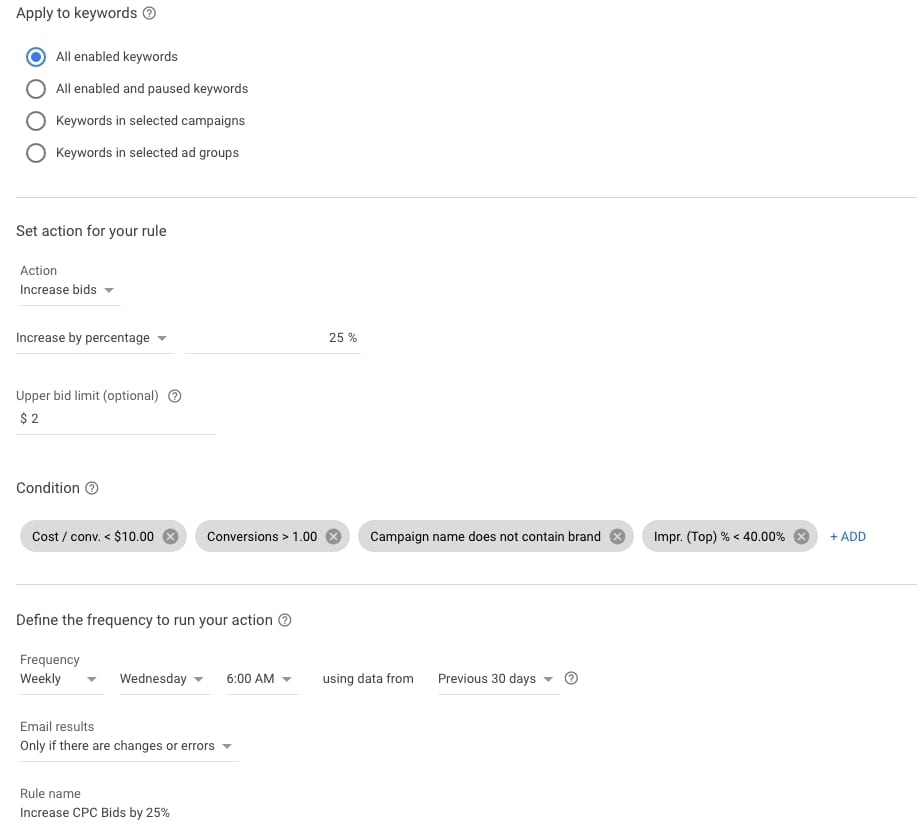4 Google Ads Automated Rules To Try

Lately, I have been embracing automation more and more. Used correctly, automation works as your sidekick in fine-tuning your campaigns. Automated rules, scripts, and third-party tools should be used in addition to your normal everyday management.
Today I want to review the Google Ads automated rules available to advertisers. In particular, I’m going to share four rules that have become commonplace in my accounts. Before sharing these rules, I’ll emphasize that thresholds will be different in all accounts. For example, I might pause keywords in my account that haven’t converted in the last 30 days and have received at least 45 clicks. For you, these thresholds may be different depending on your account-specific intangibles. It’s important to understand why you are running the rule and to adjust thresholds accordingly.
Rule 1 – Increase CPC Bids
This rule reviews all your enabled keywords and increases bids whenever certain requirements are met. The goal of this rule is to gain additional exposure for converting keywords that are under cost per conversion goal.
The example below showcases a rule that runs weekly, increasing CPC bids by 25% on keywords with CPAs below $10.

With this rule, we’re telling Google to increase bids for terms under cost per conversion goal that have less than 40% Top Impression Share. The Impression Share threshold is set so keywords already appearing in the top positions of the SERP fairly often don’t receive higher bids (where they would potentially spend more and increase cost per conversion).
We’re also setting a threshold for the max bid. In other words, no matter how well the keyword is performing, we never want to bid above $2 because at that cost we lose profitability. As a final note, the brand campaign is not included in this rule. Due to the importance that branded campaign conversions and revenue have on the overall account, I want to ensure that I make all bid changes manually.
Rule 2 – Pause Ineffective Keywords
The purpose of this rule is to review and pause non-converting keywords. The timeframe used in the example below is sixty days. I believe this threshold to be a generous window to determine whether or not a keyword is performing.

It is also important to consider assisted conversions. With this rule, we’re isolating keywords that are doing very little to help last-click conversions, and then we’re pausing them. If you know that certain keywords rarely drive large last click volume, but play a vital part in the top of the funnel, make sure you take that into consideration when using this rule.
Rule 3 – Increase Bids on Low IS
This rule ensures you are showing at least half the time on top-performing keywords. It uses three simple metrics – conversions, search lost IS (rank), and cost per conversion.

These numbers will obviously vary depending on the account and goals. However, you’ll notice this rule doesn’t contain a branded campaign qualifier like the other rules. As an additional automated rule, you could duplicate Rule #3 and make it specific to your brand campaign, but with more aggressive impression share qualifications. This would help keep a constant pulse on your branded impression share.
Rule 4 – Receive Emails for Ineffective Ads
This rule is the same as the ineffective keyword rule, with two differences. The first difference is that instead of keywords, we’re looking at ads.

The second difference is that this rule emails you instead of making the changes. You should always have at least three ads running in every ad group, but unfortunately, this sentiment isn’t always practiced. With Google sending an email, you can review each ad group and pause accordingly. And if there are only one or two ads, write another!
Conclusion
The rules I’ve laid out are a good start for automating aspects of your account. You can go more in-depth with these rules, but remember that automation is meant to help; not replace the human touch. Be willing to explore automation while ensuring that it doesn’t replace your efforts.
What are some rules that you set up in your accounts? Leave your comments below!
—-
Post updated by Connor Regan (prior post date: 4/2/18)



